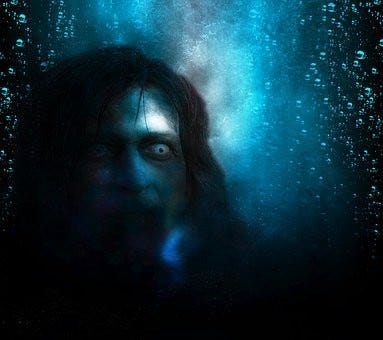
This is the latest in a series, and really only makes sense if you’ve read the preceding three articles, and preferably the earlier ones, especially the introduction. (For a guide to the whole series, see under Religion and Spirituality at the top of the Blog Index page .)
It’s possible that some readers might have been wondering whether all this material about demons and possession is of any relevance to their lives, or whether it might all be just a fringe issue which concerns only those working in the field of mental health. That’s assuming that you have been persuaded by the evidence I’ve presented that the phenomenon is real in the first place. Here I’m going to suggest that the question of demonic possession has significant implications for society in at least two, and possibly three or four, areas.
The most obvious is mental health itself. Vast amounts of money are spent in trying to deal with all levels of this problem. There are many psychiatric hospitals, mental institutions which need to be funded and staffed. Wouldn’t it be enormously beneficial if we could find some way to heal the patients there? In order to heal anyone, we need to understand correctly the underlying problem.
We should not rush to assume that every mental health problem is the result of the activity of Van Dusen’s lower-order spirits but, at the very least, it’s worth holding that as a working hypothesis, especially if all other avenues have been exhausted. This may be appropriate in mental health problems much less extreme than schizophrenia. An obvious example would be self-harming, which is an increasingly common phenomenon; that is exactly the type of thing you would expect a lower-order demon to command. Depression, eating disorders, low self-esteem etc. are other problems which may possibly be attributable to the influence of lower-order spirits, even if only in a small way. Remember that Swedenborg said that the interactions or relationship with spirits is normally not conscious for humans. In ‘primitive’ tribal societies, people would probably have recognised the signs immediately, and sought help from their shaman. We are not likely to be aware of this possibility in modern times, if we deny the existence of demons in the first place.

There are also implications for the legal system. Is it just possible that serial killers, those responsible for mass-shootings, men who hide in bushes and rape and murder passing women, are demonically possessed? They are undoubtedly severely disturbed, and the vast majority of people would not hesitate to call them evil. Why not take the extra step and say that they are actually possessed by evil? In the light of what Van Dusen says about the lower order, “they attempt to destroy, they can cause anxiety or pain… they seek to destroy conscience, and seem to be against every higher value”, this would seem very reasonable to me.
If this is true, it would still be hard to know how to deal with the problem, what action to take. It would not be difficult to have a coherent strategy in the case of mental health, because the patients are confined in institutions or, at the very least, seeking help in therapy. It is much harder to know what to do about potential criminals who are at loose in society, given that these individuals tend to plot alone and in secret. When their crimes have been committed, it is too late.
Once they are imprisoned, then some kind of treatment programme would be possible. Before that, all we can do is to accept the reality of demonic possession, try to understand what can lead to an invasion. Trained professionals, and hopefully others, might be able to spot the danger signs, identify possible victims, then take the necessary action by informing the authorities.

Those two categories seem reasonably clear cut to me. The third is perhaps more tenuous, but what about politicians? Do not some world leaders, and other figures in their governments, seem highly dangerous, to say the least? An obvious historical example would be Hitler. When you see him giving speeches in TV documentaries, he gives every appearance of being possessed; he does not look like a normal human being, as he rants and raves in a sinister way. I leave it to the reader to speculate whether this might be true of anyone currently in high office; it does not have to be so blatant as Hitler.
Then we come to science. I’m going to go out on a limb in this last section, and make a controversial suggestion. Scott Peck’s book is a brave attempt to come up with a psychological understanding of evil. For those who haven’t read it, the early chapters, which describe some of the cases he has dealt with, are a real eye-opener. This is not just about violence, power-mad people, psychopaths etc. It is also not about full blown demonic possession (apart from the one chapter discussed earlier), which is, thank goodness, rare. A lot of evil is much more subtle, although no less sinister and destructive. There are many examples on a smaller scale of possible lower-order ‘demonic’ involvement in human affairs. The title of the book People of the Lie is therefore significant; Peck associates lying with evil: “Lying is simultaneously one of the symptoms and one of the causes of evil, one of the blossoms and one of the roots” (p218).
There are many types of lying, not just the obvious one of deceiving someone else for whatever reason. There is self-deception, sometimes on a grand scale. There is also the problem of acting with a complete lack of self-awareness, total obliviousness to the destructive consequences of one’s actions, therefore unconscious evil. Peck gives some frightening examples of such people.
He concludes: “Mental health is “an ongoing process of dedication to reality at all costs” (p207); one might call this a struggle for more self-awareness, increased consciousness, a battle against self-deception. ‘Reality’ here is an obvious synonym for ‘truth’. He also says: “(Science) assumes a profound human tendency to self-deception, employs the scientific method to counteract it, and holds truth higher than any personal desire” (p209). In his terms, therefore, we can say that the search for mental health and scientific truth are both a struggle against lies, therefore against evil in some form.
A large section of humanity is, or believes it is, engaged in a search for truth: philosophers, scientists in many disciplines, theologians, religious people, and those members of the general public who follow the debates. (There are many such people writing on Medium.) Truth is a much sought after commodity. I’m fond of the adage,“there is no religion higher than truth”.
What I’m about to say does not apply to all scientists. There is obviously much great work done in the name of science. However, science claims to be dedicated to the study of reality, the search for truth and, as Scott Peck said, it “assumes a profound human tendency to self-deception”. Some scientists, however, seem to assume that they have risen above this problem, that they are not prone to this tendency themselves, in effect that they are superhuman simply because they are scientists. There is much evidence to the contrary.
If truth is the goal, it seems obvious to me that everyone should be completely open-minded to all possibilities. It is extraordinary, therefore, that so many ‘thinkers’ rule out certain possibilities on principle. One example is the unwillingness of many scientists to contemplate the supernatural, the paranormal, and their obsession with ‘natural’ explanations, even when these seem completely inadequate. Some of them are contemptuous of any mention of ‘religious’ ideas in relation to science. They spend much time and energy writing (on the whole unimpressive) tracts against religion, wedded, as they are, to the philosophy of atheistic materialism.
For example, Richard Dawkins, author of The God Delusion, coined the term meme, which means an idea that spreads from person to person within a culture. He has said that religion or religious beliefs are such memes which, like a virus, jump from brain to brain and infect them. He doesn’t appear to have ever once stopped to consider that his atheism and hatred of religion may be viruses that have affected his brain. That would, in my opinion, be much closer to the truth. Does this remind anyone of Van Dusen’s lower order and their hatred of religion?
Examples of the ‘lies’ in which some scientists indulge are:
- the ignoring of evidence and valid research, treating it as though it did not exist
- the allegation of fraud or the accusation, without good reason, that experiments were conducted improperly
- the indulgence in ad hominem attacks on the individuals involved, instead of evaluating their work objectively
- deliberately falsifying their own findings if they do not fit in with their desired outcome
- not taking into account the latest developments in science which contradict their own beliefs
- refusing to investigate a certain field because they do not want to find evidence of something which would challenge their worldview, their preconceptions.
We might call such scientists ‘people of the lie’; they certainly don’t hold truth higher than any personal desire, to use Peck’s phrase. However, I do not imagine for one moment that they are acting in this way consciously. I’m sure that they consider themselves sincere seekers after truth, and are serving humanity. As I said above, much lying, therefore in Peck’s terms evil, is unconscious. One could argue that unconsciousness of this type is the major problem confronting humanity in general, not just scientists. The human condition has sometimes been described as the mists of illusion. The French novelist André Gide once said: “The true hypocrite is the one who ceases to perceive his deception, the one who lies with sincerity”. Put more simply: “The true hypocrite is the one who believes the lies he tells himself”. The extent to which the lower order might be responsible for that is an interesting question, to which I don’t know the answer.
In relation to the last point in my list above, Scott Peck says that “the phenomena of possession and exorcism need to be studied scientifically… There is a resistance to such scientific study — a part of the more general resistance of science toward the spiritual and ‘supernatural’. It is interesting that while possession and exorcism have never been scientifically studied, to my knowledge, in America or Europe, Western anthropologists have written extensively about exorcismlike healing rituals in distant foreign or ‘primitive’ cultures. It is as if it is somehow ‘OK’ to study such things ‘over there’ at a considerable distance from us as long as we don’t look at what’s going on closer to home among ourselves” (p200).
Such unwillingness to even contemplate the study of the phenomenon of demonic possession means that these scientists are unconsciously happy to allow evil to continue doing its work in our world, all for the sake of maintaining their precious worldview that there is no such thing as the supernatural. I would call these scientists People of the Lie.